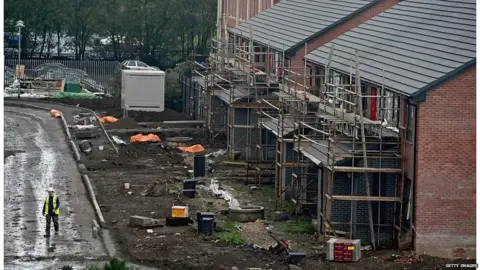New borrowing rules will 'boost home building'
 Getty Images
Getty ImagesNew powers to fund house-building have been announced, as ministers promised more measures in next week's Budget.
Housing associations will be reclassified as private bodies allowing their £70bn debt to be removed from the government's balance sheet.
They said the technical change would allow them to build more affordable homes.
But Labour said the government had no coherent plan to address the "housing crisis".
Latest figures show 217,350 "additional dwellings" in England last year, which includes new builds, conversions and changes of use. This was up by 27,700 up on 2015-16.
Labour said any increase was welcome but that house-building had still not returned to the level it reached before the global financial crisis.
Visiting a north London housing estate, Prime Minister Theresa May pledged to take "personal charge" of the government's strategy to address what is widely regarded as the chronic shortage of new affordable homes being built, particularly for rent.
There have been reports of tensions within the cabinet about whether the government should be borrowing tens of billions to directly fund more schemes.
In a speech in Bristol, Communities Secretary Sajid Javid said the decision by the Office for National Statistics to remove housing association debt from the UK balance sheet would help create a more "stable investment environment" for the thousands of providers.
Housing associations were classified as public bodies in 2015 because of the way they were funded - a move that led to warnings it would hamper their ability to fund new house-building.

Analysis
By BBC home editor Mark Easton
In 2015, the Office for National Statistics shocked the government by announcing that ministerial control of housing associations had become so intrusive they could no longer be seen as charities or private businesses.
Overnight, all their borrowing was added to the public debt.
Now, after the drafting of new regulations currently going through Parliament, the ONS has agreed the government has become hands-off enough again to take all that debt away.
The announcement of the change, before the new regulations have come into law, appears to be part of a move to encourage Philip Hammond to offer more help to the housing sector.
Whether such pressure will move the Treasury to loosen the purse strings remains to be seen.

The National Housing Federation, which represents housing associations, said it strongly supported the reclassification.
It said housing associations built nearly 50,000 new homes last year, including social and affordable rental properties.
The federation added: "This change will allow them to build on their strong track record and secure the long-term finance needed to build even more affordable homes."
Mr Javid said the rethink would help "lay the foundation" for thousands and thousands of new homes.
But he warned new thinking is required to stop "a rootless generation" of tenants drifting from one short-term tenancy to another.
"There are many, many faults in our housing market, dating back many many years. If you only fix one you will make some progress but not enough. This is a big problem and we have to think big."
He also said the government would be intervening in the case of 15 local authorities which have failed to produce a local plan for housing development in their area.
More than 1.2 million families in England are currently on the waiting for council accommodation while in 2015-6 only 6,800 social rented homes were completed.
The Local Government Association said councils should be given the same freedom to borrow to build.
